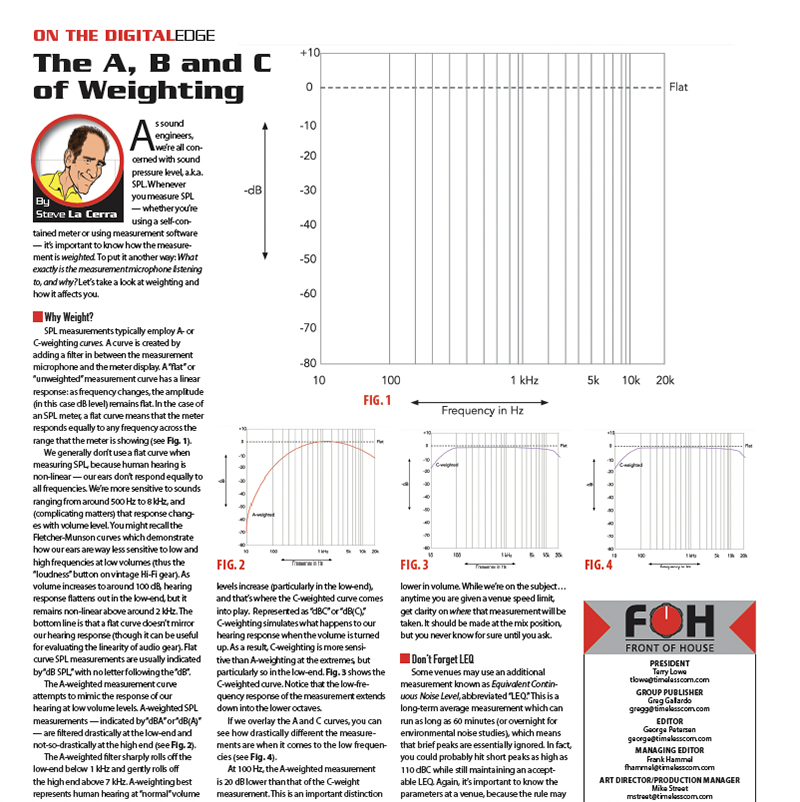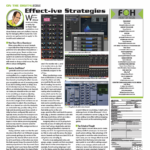
I often wonder if anyone actually intends to be a tour manager, or if it’s something that just happens while you’re wandering through life — like getting hit on the head with a coconut while walking under a palm tree. My adventure into tour management came when Blue Öyster Cult’s previous TM left on short notice to take another gig, and what happened on my first weekend is a story for another time. Meanwhile, here are some of the things you can expect if you decide to take up tour managing as an exciting new career (!).
Rule Number One
Management might argue that the single most important part of a tour manager’s job is making sure the band is paid, but that goes hand in hand with getting everyone into town safely, because if the band doesn’t show up to the gig, it’s going to be really difficult to get paid. During the summer touring season, I speak with our travel agent more than I speak to my own mother. Seriously. Our routing is such that we are never on a tour bus in the ‘States — it’s always rental cars or promoter-provided local ground and planes. For example, this week, we’ll do a show in Plymouth, MA on Friday, another in Laconia, NH on Saturday, and go home on Sunday. It’s prohibitively expensive to hire a bus for the weekend, so my crew will drive with our gear, the NY-based people will drive rental cars, and the guys that live out of town will fly into a local airport. It’s on me and the travel agent to book the flights, car and van rentals and hotel rooms.
Back to Rule Number One
Payment comes in various forms ranging from company checks to cashier’s checks to wire transfers to (occasionally) cash. (Sorry, but we don’t accept Bitcoin.) The contract face stipulates the guarantee, the deposit (if any), acceptable forms of payment, and possibilities for a bonus (e.g. “plus $1,000 at 950 tickets sold”). The guarantee is the amount of money that the band is guaranteed to be paid, regardless of attendance. Details depend upon who is paying for the show. For example, if it’s a Live Nation show, there’s typically a 10% deposit with the remainder to be paid in a company check or wire. Like them or not, checks from Live Nation clear. When the show is with an unfamiliar promoter or venue, I’ll pick up a cashier’s check. It’s on me to make sure that the checks are issued correctly, so I double- and triple-check that the payee name is correct because banks don’t cut any slack for a check that’s been modified by hand. In spite of my steadfast efforts, there’s an error once in a blue moon, at which point a call to management works out a solution. Fun.
Rule One-A
Hand in hand with Rule Number One is Rule One-A. If you haven’t been paid, do not put the band on stage. When the show is over, you have no leverage. Many years ago, I watched while a club owner shuttled money from the bar to the TM while a band was performing so that they would continue playing. No joke.
You’ll also be responsible for tour accounting, paying for hotel rooms and rental cars, reimbursing band and crew for road expenses and distributing PD (per diem). Microsoft Excel is your friend. Learn how to set up a basic spreadsheet that tracks incoming and outgoing funds.
Room Service
There are times when management will negotiate hotel rooms as part of the guarantee, in which case the venue or promoter will arrange them. As TM, you send them a room list, which they’ll ignore. A few weeks ago when we checked into a casino/hotel, there were people on the room list who hadn’t worked for the band in five years. One of the difficult aspects of working for a band that’s been around so long is that there’s tons of old paperwork laying around in file cabinets (virtual or otherwise). Why anyone would think that a room list dated 2017 is still valid boggles my mind, but it happens.
TM responsibilities also include advancing meals and dressing room hospitality and making sure that dressing rooms are cleaned and sanitized (we’ll leave out the part about being Covid police). This is an important aspect of touring, because if your crew is hungry, they might get hangry, making for an unpleasant day. Some promoters will ask if everything on the hospitality rider is really necessary, and the answer is usually “yes,” because you need contingencies. What if soundcheck runs late and the crew doesn’t have time for dinner? What if the venue provides catering and it sucks? (That’s why there’s always peanut butter, jelly and bread on the rider). Meals are handled in a variety of manners. The venue may have an in-house restaurant or catering, or might have an arrangement with a nearby establishment (good luck getting everyone to agree on a time for dinner!) They might offer take out menus and a runner to bring food back to the venue, or they might offer a “buyout” — a payment per person for lunch and/or dinner. Getting cash for a buyout is important, because you can’t split a check 10 ways, and a check made out to management is useless on the day of show. Make it clear to the promoter ahead of time that pizza or food from a fryer does not constitute dinner.
Crunch Time
It’s a sign of the times that touring personnel often do two jobs, like monitor engineer/TM. In my case, it’s TM/FOH engineer. I spend most of the day doing TM stuff and only a few hours as an engineer, so an organized library of console files helps get my mix up and running with minimal fuss. I have no hesitation about asking for help from the house tech if I run into an unfamiliar console, and most techs are more than willing to accommodate. Use offline console file editor apps to prep at home and save time at the gig. As a courtesy, always ask the house tech if it’s okay to load a file in their desk before you do so. Not only is it just plain rude, but you don’t know what may or may not be “hot” on the stage when your file loads. Also, the house tech may want to “safe” a complex output patch so that it doesn’t have to be recreated for your file.
I don’t have the luxury of a merch person, so when sound check is over, I usually count in merchandise. Some venues have a house vendor, while others won’t, and you’ll need to hire a local person (most venues have a trustworthy local person who can sell). The house almost always gets a cut of merch, and the split is usually found on the contract face, stated something like “80/20 Artist Sells’” or “75/25 House Sells” — meaning that the house gets 20% if the band provides the seller, or the house gets 25% if the house sells. The aforementioned numbers typically apply to “soft goods,” meaning T-shirts, hats, hoodies, etc. There’s often a different split for media, like 90/10, and while it sounds like a great idea to sell CDs or LPs at a show, remember that it’s another item you’ll need to count in/out. Luckily for me, our management rarely sells more than two items for tour dates here in the ‘States, and may add a third item for dates in the UK. There simply isn’t enough time in the day to count in/out a couple hundred keychains or bandanas — which was a real mess when I witnessed it years ago.
Prepare to Walk Sideways
A TM on the road is working 24/7. At any moment, your day can go sideways due to the dumbest things like someone losing their cell phone, missing a connecting flight, or lost baggage (remind me someday to tell you about the show we did in Boston where the airline lost 18 out of 20 pieces of baggage, including all of our instruments). If one of the group has a problem, it’s probably your problem too. Keep a level head. I hear way too many stories about TMs who act rude to the house crew or are just plain jerks about simple miscues like a missing meal for someone with special needs. Ours is a small world, and we run into the same people over the years.
In return for your efforts, you’ll get admiration, fame, and make millions of dollars each year — Not! You will make more than you would if you were just mixing FOH or monitors, and you’ll learn a ton about how the business works. And maybe, just maybe, a few times a year — when you pull off a miracle getting ten people to a gig in spite of a missed connection or a canceled flight — you get to watch the audience leave a show with smiles on their faces because you brought them a bit of happiness. That’s really why you do it.
Steve “Woody” La Cerra is the tour manager and front of house engineer for Blue Öyster Cult.



